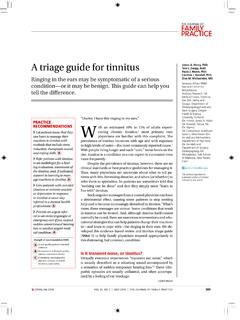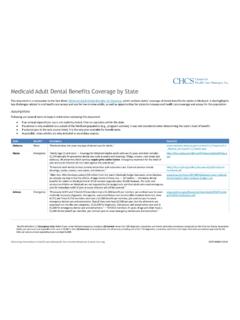Transcription of How to Manage Your Tinnitus: A Step-by-Step Workbook …
1 How to Manage Your Tinnitus: A Step-by-Step Workbook Third edition James A. Henry, PhD. Tara L. Zaugg, AuD. Paula J. Myers, PhD. Caroline J. Kendall, PhD. James A. Henry, PhD. VA RR&D National Center for Rehabilitative Auditory Research (NCRAR) at the VA Medical Center and Department of Otolaryngology, Oregon Health &. Science University; Portland, Oregon. Tara L. Zaugg, AuD. VA RR&D National Center for Rehabilitative Auditory Research at the VA. Medical Center, Portland, Oregon. Paula J. Myers, PhD. Audiology Clinic, James A.
2 Haley Veterans' Hospital, Tampa, Florida. Caroline J. Kendall, PhD. VA Connecticut Healthcare System, West Haven, Connecticut and Department of Psychiatry, Yale University, New Haven, Connecticut. Design and illustrations: Lynn Kitagawa, MFA, Medical Media, VA Medical Center, Portland, Oregon. Photography: Michael Moody, Medical Photographer, Medical Media, VA. Medical Center, Portland, Oregon. Dedication This book is dedicated to our nation's military Veterans. We thank you for serving our country. You are the reason we enjoy freedom.
3 Acknowledgments Development and publication of this book was supported by VA Rehabilitation Research and Development (RR&D) Service, the NCRAR, and VA Employee Education System. Numerous individuals have contributed in various and significant ways toward this effort, including: Russell L. Bennett (Computer Specialist, Long Beach Employee Education Resource Center, Long Beach, California). Daniel C. Garcia (Graphic Designer, Long Beach Employee Education Resource Center, Long Beach, California). Katie J. Fick, MS (Research Assistant, James A.)
4 Haley Veterans' Hospital, Tampa, Florida). Jeff Hall (Production Sound Mixer, Salt Lake City Employee Education Resource Center, Salt Lake City, Utah). Christine Kaelin, MBA (Clinical Research Coordinator, NCRAR, Portland, Oregon). David Lehman (Executive Producer, Salt Lake City Employee Education Resource Center, Salt Lake City, Utah). Marcia Legro, PhD (Research Psychologist, Seattle, Washington). Will Murphy (Audiovisual Production Specialist, Portland VA Medical Center). Kimberly Owens, MPH (Clinical Research Coordinator, Saint Thomas Research Institute, Nashville, Tennessee).
5 Emily Thielman, MS (Research Assistant, NCRAR, Portland, Oregon). Dwayne Washington (Audiovisual Production Specialist, Portland VA. Medical Center). John C. Whatley, PhD (Project Manager, Birmingham Employee Education Resource Center, Birmingham, Alabama). Also, thanks to Stephen Fausti, PhD and Sara Ruth Oliver, AuD for their continued support of tinnitus research and clinical activities at the PVAMC. My Contact Information Table of Contents Part 1. Introduction 1. What is Tinnitus? 1. Should I See a Physician?
6 2. Tinnitus at a Glance 4. How Can This Workbook Help Me? 6. Goals of Tinnitus Management (All Methods) 7. Part 2. Step-by-Step Guide: Using Sound to 9. Manage Tinnitus Tinnitus and Hearing Survey 9. Using Sound to Manage Reactions to Tinnitus 12. Environmental Sound, Music, and Speech 13. Sound Grid 13. Soothing Sound 14. Background Sound 17. Interesting Sound 22. Test Your Understanding 25. Develop a Personal Sound Plan 27. Key Points for Your First Sound Plan Worksheet 27. Ongoing Use of the Sound Plan Worksheet 27.
7 How to Fill Out the Sound Plan Worksheet 27. Tinnitus Problem Checklist 29. Example of Completed Sound Plan Worksheet 30. Part 3. Step-by-Step Guide: Changing Thoughts 37. and Feelings to Manage Reactions to Tinnitus Relaxation Exercises Deep Breathing 38. Imagery 40. Pleasant Activity Scheduling 44. Changing Thoughts 48. Changing Thoughts and Feelings Worksheet 57. Part 4. Protect Your Ears! 61. Standard Earplugs 63. Custom Earplugs 63. Hi-fi Earplugs 64. Electronic Earplugs 64. Earmuffs 64. Appendix A: Description of Tinnitus 65.
8 Appendix B: What Causes Tinnitus? 67. Appendix C: Methods of Tinnitus Management 72. Appendix D: What To Do When Everyday Sounds Are Too Loud 81. Appendix E: Effects of Tinnitus 84. Appendix F: Effects of Hearing Loss 87. Appendix G: Examples of How People Use Sound to Manage 88. Reactions to Tinnitus Appendix H: How to Choose Devices 93. Appendix I: Tips for Getting Better Sleep 99. Appendix J: Resources 102. References 104. Copies of Sound Plan Worksheet Copies of Changing Thoughts Worksheet Managing Your Tinnitus DVD.
9 Managing Your Tinnitus, Sound Demonstration CD. Read Me First This Workbook does not, and cannot, provide individual medical advice. It is for general information purposes only. The information is not intended to be a substitute for individual medical advice, diagnosis, or treatment by a physician who is aware of your medical history and has examined you. Do not rely on this Workbook in place of seeking professional medical advice. If you notice any significant change in hearing, tinnitus, or ear-related medical problems, you should contact your primary care provider for referral to an audiologist or ENT (Ear, Nose, Throat) physician, as appropriate.
10 Audiologists do not prescribe medication (drugs). Any medication concerns should be directed to your primary care provider or other physician. Please contact an audiologist if you have any questions regarding the information contained in this Workbook , or if you have questions about tinnitus, hearing loss, or hearing aids. If you are a Veteran seeking a claim for service connected hearing loss or tinnitus, you should contact your VA Regional Office or Veteran Service Representative for information as to how to proceed.








